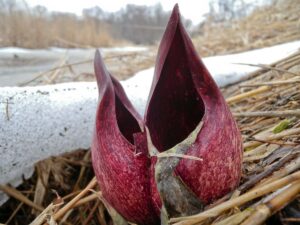Plant Family: Arum, Araceae
Wetland Indicator Status: OBL

During those first spring hikes the family took each year along muddy lake shores and creek bottoms, my parents pointed out Eastern Skunk Cabbage (Symplocasrpus foetidus). Related to neither skunks (obviously) nor cabbage, this strange plant was one of the first wildflowers I recognized as a kid, although I don’t think I knew at the time that it was actually the flowering part of this forb I was looking at.
The plant is a mimic. Many flowers we are familiar with are brightly colored and aromatic. These are advertisements to bees, butterflies, and a host of other insects that there is a source of pollen and nectar to drink. These insects visit other plants of the same species, carrying pollen and ensuring cross-pollination. The skunk cabbage takes a different strategy. The freezer that is winter stores up the carcasses of animals that have died of disease, starvation, accidents, hunting, and old age. The not-so-pretty side of nature is revealed as the snow melts. When the carcasses emerge, so do flies and other insects that feed and lay eggs on carrion. The skunk cabbage emerges at the same time, producing its own heat and melting the surrounding snow. It takes on the look of flesh and produces a fetid smell, attracting insects that will then transfer pollen from one plant to another. The poor flies fall for the false advertising millennium after millennium, ensuring another generation of skunk cabbage.
Skunk Cabbage is an extremely bitter plant. Oftentimes, bitterness is associated with medicinal properties, and Skunk Cabbage is no exception. It was used by Native Americans for epilepsy, toothaches, convulsion, and a host of other maladies. It should be considered toxic, however. I have no direct experience consuming this wild plant and cannot say whether they are safe to eat, or if they are legal to collect in your area. Collect and consume at your own risk




